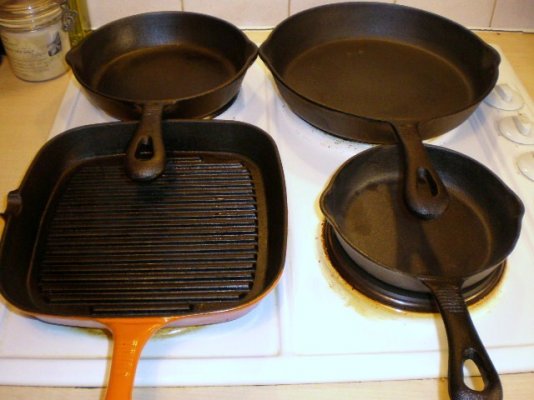People are always saying that you can't cook acidic foods in cast iron. I beg to differ. my experience has been that once the pan is properly seasoned, it will cook anything, including highly acidic and alkali foods, without any problems from off flavors and leaching metal. The seasoning is a thin layer of very tough carbon (polymerized oil from high temperatures), that create a seal between the metal and the foods. It's also the part that makes a well seasoned pan nearly stick free. I have seasoned cast iron, carbon steel, and aluminum pans succesfully, and all work very well for their intended purposes.
As for the ridges on a grill pan, they simply lift the food out of the grease. This is sometimes a good things, sometimes not, depending on what's being prepared.
Another wive's tale is that searing with high heat seals in juices. It does not. Cooking to proper temperature gives juicy meats. The high heat simply develops flavor through the maillard reaction.
Cast iron and high-carbon steel are very similar in their cooking properties, with the high-carbon steel generally weighing less than its cast iron cousin. Of course the steel is less brittle than is iron. Also, steel, carbon steel, and cast iron are all pour conductors of heat, and quickly develop hot spots due to that poor conductivity. Cast iron minimizes the problem by its mass. It takes more time for that mass to heat, and thereby allows the heat to propagate through the pan more thoroughly. On the other hand, carbon-steel and stainless steel heat more quickly, and if used with a heat diffuser can be used effectively for stir fries, sauteing, and bringing liquids rapidly to a boil. Cast iron is great for frying due to its thermal mass. It stores more heat, and therefore is less prone to cooling rapidly when cold foods are added.
Cast iron can be cracked by placing a very hot pan into cold water, or pouring very cold water into a hot pan. This is caused by thermal shock. Cast iron isn't very malleable. Thermal shcok will cause steel to warp. Cast iron breaks.
Seeeeeeya; Chief Longwind of the North


